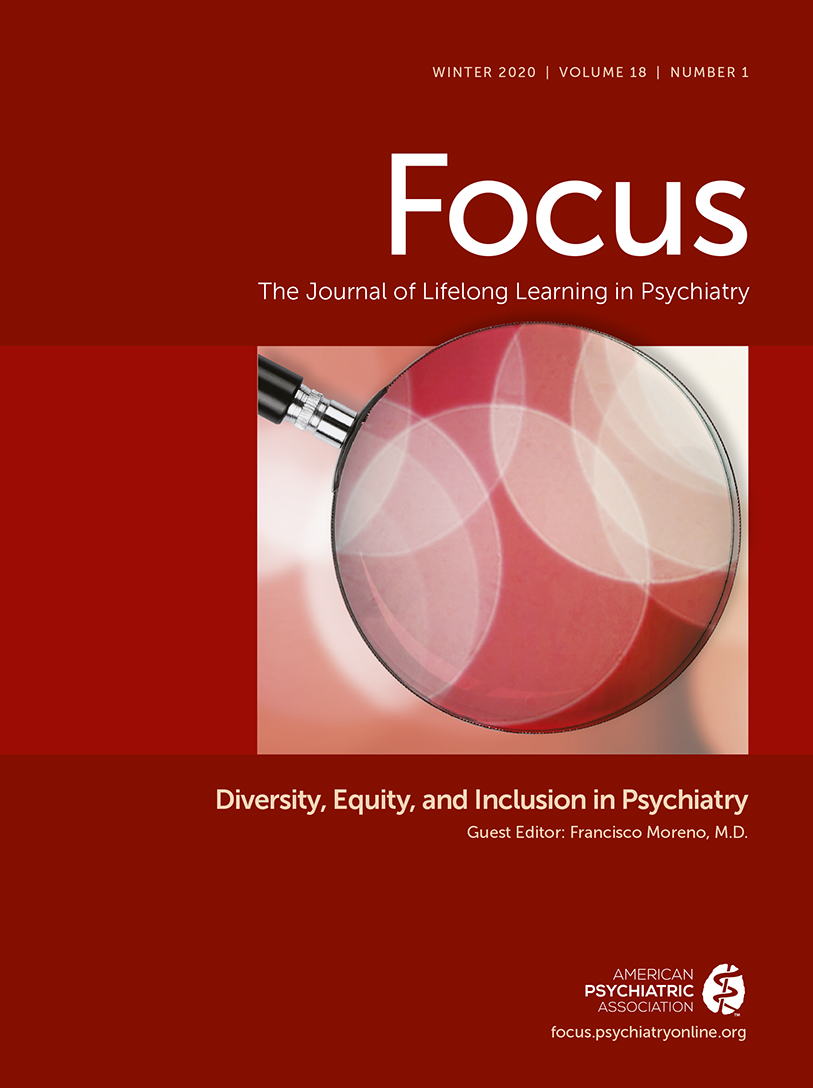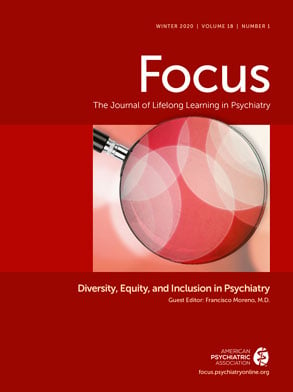The demographic diversity of the patient population in the United States is rapidly increasing. The U.S. Census Bureau has projected that individuals of racial and ethnic minority backgrounds will make up more than half of the population by 2060 (
1). Although some of the characteristics that make people different from one another are visible, others are not.
Despite the responsibility to provide competent care to all patients, physicians often have insufficient training to address ethical quandaries in caring for patients from diverse cultural or other backgrounds. The
DSM-5 defines culture as “systems of knowledge, concepts, rules, and practices that are learned and transmitted across generations” (
2). Cultural competency is an example of a professional standard of clinical care for patients such that they are provided with “effective, equitable, understandable, and respectful quality care and services” with respect to their culture (
3). A culturally competent physician appreciates how cultural diversity shapes the experience of illness, the doctor-patient relationship, and ultimately the health care system (
4).
In addition, the American Psychiatric Association has deemed cultural competency as essential for effective delivery of health care in the U.S. medical system. When patients feel that their caregiver is culturally competent, they are more likely to follow up with provider recommendations and engage in the health care system. These behaviors, in turn, are associated with improved health outcomes for these patients (
3).
Practicing in a culturally competent manner can be particularly challenging in the field of psychiatry, given the amplified degree of vulnerability and intimacy that can exist in therapeutic relationships. Psychiatrists should strive to develop rapport with patients from different cultural backgrounds to develop a therapeutic alliance. At times, patients may also ask psychiatrists to reveal their own backgrounds. In such circumstances, psychiatrists may also need to consider whether, to what degree, and how to share information about their own characteristics.
The following case vignette illustrates one scenario that may be encountered by psychiatrists treating today’s increasingly diverse patient population. Relevant ethical aspects of the vignette are subsequently discussed, and suggestions are offered regarding pertinent opportunities to use the culturally competent psychiatrist’s skills for the patient’s benefit.
Case 1
Maria is a 25-year-old undocumented Latina woman who works as a strawberry picker. Her cousin brought her to a rural psychiatric emergency services facility out of concern for Maria’s worsening depressive symptoms and intermittent suicidal ideation. Her cousin speaks some English and can interpret for Maria, who is primarily Spanish speaking. As the psychiatrist in the emergency room, you learn that Maria was quite reluctant to come today, although she acknowledges that she could use psychiatric attention. With the help of a hospital interpreter, you obtain further history that Maria had seen her primary care doctor for depression. Although that physician prescribed an antidepressant, Maria has taken this medication only intermittently because she did not understand the English directions on the prescription bottle. She has never seen a psychiatrist.
On the basis of your clinical assessment, you believe that she is at high risk of attempting suicide and feel that the degree of her suicidality is severe enough to warrant inpatient hospitalization. Your treatment plan in these kinds of cases is typically to transfer the patient to the nearest inpatient psychiatric unit, which is 50 miles away. On discussing this plan with her, Maria pleads that she cannot be hospitalized because she fears that she will lose the support of her family—as well as her job—if she misses a day of work because of mental illness. She is willing to contract for safety, though. In addition, she promises to follow up with her primary care physician within a week. What is the next best step in the clinical management of this patient?
A.
Discharge the patient with psychiatric outpatient follow-up within 1 week.
B.
Place a psychiatric hold and immediately pursue transfer to an inpatient psychiatric facility.
C.
Place a psychiatric hold but delay the transfer to an inpatient facility until after a period of observation.
D.
Ask the patient whether she will stay voluntarily in psychiatric emergency services for a longer observation period.
E.
Give the patient the address of a nearby hospital with a psychiatric ward and ask her to request voluntary psychiatric admission.
This case highlights tensions among several ethical principles, that is, beneficence (i.e., pursuing appropriate psychiatric treatment for this at-risk patient), nonmaleficence (i.e., potentially isolating the patient from her main support networks, including her family and source of income), and autonomy (the patient does not want to be hospitalized). Maria is preoccupied with the stigma of mental illness, which is a well-documented barrier to accessing appropriate mental health care. However, she appears to lack insight into the severity of her depression, perhaps compromising her autonomy. Moreover, she may lack access to adequate resources to appropriately address on her own the acuteness of her psychiatric decompensation. Culturally competent physicians use their skills not only to ensure the patient’s safety but also to understand the potential role of culture in precipitating or exacerbating the patient’s psychiatric symptoms and, as in this case, serving as a barrier to obtaining optimal care. Pursuing a psychiatric hold while gathering additional information from collateral sources to verify the extent of the patient’s reported psychosocial stressors is the most appropriate next step; thus, the correct answer is C.
This case also raises some challenging ethical and clinical issues related to the patient’s immigration status. For example, one recent study reported a higher risk of depression and anxiety, as well as other mental health issues, among undocumented Latino immigrants (
5). Latinos in states with more exclusionary immigration policies report more poor mental health days than those living in states with less exclusionary policies (
6). High rates of mental illness in this population may be a symptom of social stressors, including threat of deportation, financial burden, and lack of social support or connections in the new country.
On stabilizing the patient, referral to appropriate culturally competent care (with professional interpreting) would be ideal (although this can be challenging in many areas). This patient appears not to have seen a psychiatrist before, perhaps because of lack of access and stigma surrounding mental health. Facilitating access to culturally competent mental health services that safeguard and protect the human rights of immigrants and their families is an important intervention (
5).
Case 1 Continues
As you ponder your next move, Maria’s cousin asks to speak with you in private to discuss more questions related to Maria’s diagnosis. After further dialogue, she shares concern that if Maria misses any days of work, her boss will report her to deportation authorities, putting her and her family in jeopardy. She then asks you whether you are going to report her family to immigration authorities. Which of the following ethical principles is the least relevant to consider before responding?
Maria’s cousin is preoccupied with deportation, with good reason—deportation is associated with greater mental health needs (
7). As is the case with many other marginalized patients facing deportation, removing Maria from her current environment could prove to be yet another challenging barrier in accessing appropriate mental health care. Legal and political conditions that affect Maria’s mental health are examples of structural inequities that perpetuate cultural disparities in health. Society expects health professionals to be attuned to and effectively address these critical circumstances of marginalized patient populations (
4). Therefore, psychiatrists must be prepared to apply relevant ethical principles (including justice, beneficence, nonmaleficence, and respect for human rights) to address questions regarding immigration status as they relate to pursuing appropriate psychiatric care. Thus, the correct answer is B.
In addition to providing acute psychiatric health services, physicians should also make a reasonable effort to bolster patients’ social support. Although social workers can provide a wealth of knowledge in assisting the navigation of this patient’s delicate social situation, physicians should have a basic understanding of laws, policies, and mental health and legal resources in their community that pertain to undocumented immigrant populations. In California, many legal support networks are available through state universities, nonprofit entities, and community centers. To my knowledge, psychiatric holds in the state of California do not necessitate reports to immigration authorities, yet it is difficult to control the actions taken by outside agencies whose interests may not prioritize patient health. Caution should be taken if communication with family, friends, or employers is attempted to prevent inadvertent disclosure of the patient’s undocumented status and to preserve patient confidentiality.
Whereas being undocumented negatively affects immigrants’ health and well-being, researchers have found that gaining legal immigration status is associated with improved psychological well-being (
8). Undocumented patients must navigate precarious legal territory. Factors that make this population particularly vulnerable include undocumented immigration status, foreign nationality, language barriers, and cultural stigma of mental illness. With the country’s changing demographic landscape, psychiatrists will encounter patients with one or more of these challenges and should be prepared to address the profound barriers that undocumented patients face when accessing health care in the United States.
Discussion
This vignette illustrates the significance for psychiatrists of sometimes hidden identities in modern-day professional environments. Although not immediately discernible, these identities have profound impacts on the way that psychiatrists approach clinical care. Although the hope is to outline a few guidelines for how to approach these ethical scenarios, it is equally important to maintain humility in recognizing and learning amid one’s struggles and limitations.
Psychiatrists must approach each patient with humility and openness to understand that person’s unique experiences and perspectives. For example, whether and to what extent the multiple diverse aspects of Maria’s identity (e.g., undocumented legal status, Mexican culture, female gender) influence her mental health are unknown. Moreover, making assumptions about her fitting into any sort of prototypical script of a patient struggling to reconcile her Mexican identity while living in the United States would be unwarranted. Nevertheless, when indicated, psychiatrists can play an important role in identifying and resolving such conflicts (
3). A culturally competent, open-minded approach allows physicians to engage in self-evaluation in their approach to patients of different backgrounds and to appreciate each person both as an individual and as part of a larger social group.
In addition to the physician’s duty to provide culturally competent care, I emphasize the importance of public professionalism, an ethical principle that deals with enhancing the welfare of communities (
9). Emerging models of health professional education focus on how structures or social structures (such as policies, economic systems, and other institutions) produce and maintain social inequities and health disparities, often along the lines of social identities such as race, class, gender, and sexuality (
10). This framework is known as structural competency and calls for physicians to shift awareness toward forces that influence health outcomes at levels above individual interactions. Such a framework further equips psychiatrists with a holistic analytic framework to address social inequities seen in diverse patient population (e.g., supporting policies that expand health care opportunities for undocumented immigrants).
To further advance the care of the increasingly diverse population, it is also important for health care institutions to continually strive for diversity in the physician workforce. A workforce that includes physicians from a variety of social backgrounds helps foster diversity of perspectives and enhances innovative advances in the field of medicine (
11). In addition, some evidence has suggested that care for diverse patients is improved with increasing racial and ethnic concordance between providers and patients (
12). It is important for academic medical leaders to not just value professional diversity in a theoretical sense, but to also provide tangible support to young people from diverse backgrounds on the path toward medicine to foster a new generation of medical leaders that accurately reflects the diversity of the population that exists in today’s society (
13).
Acknowledgments
Dr. Saenz thanks Bianca R. Argueza, M.D., M.P.H., and Dre Irizarry, M.D., for their thoughtful review and insights.

